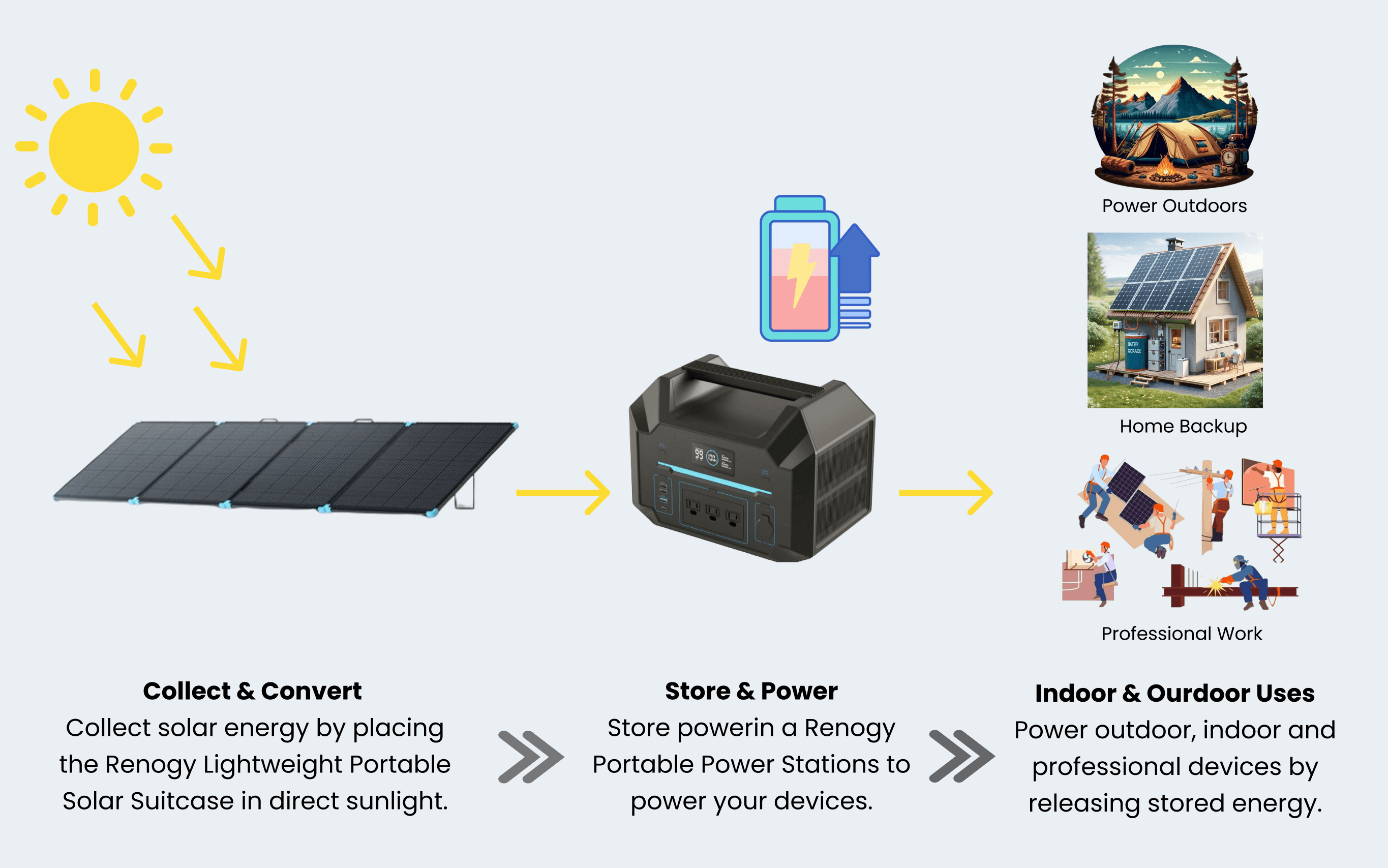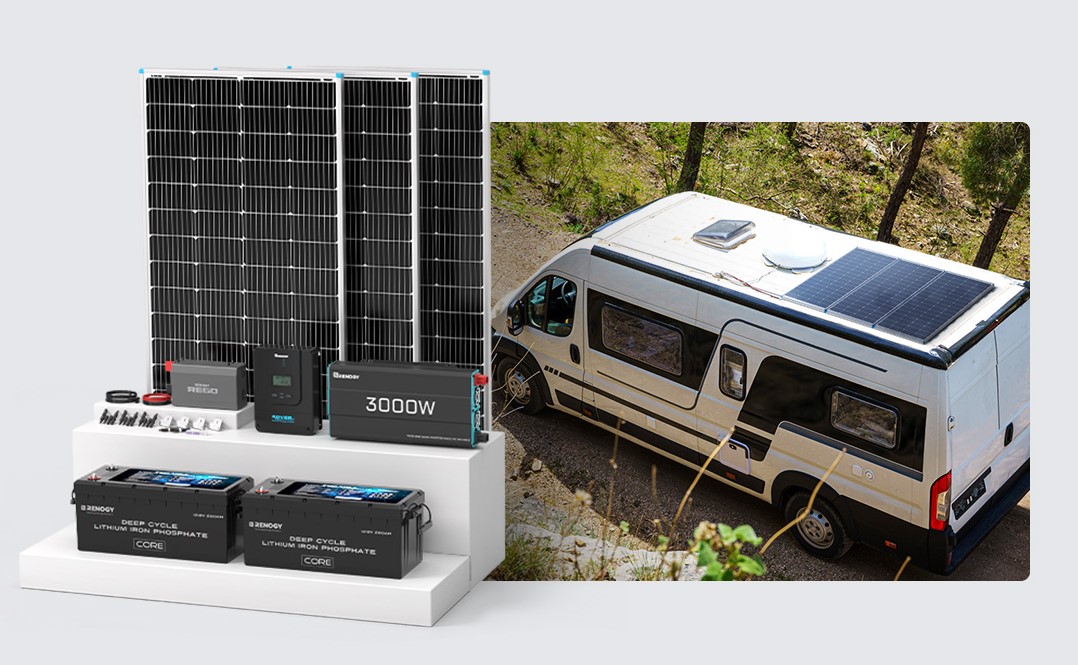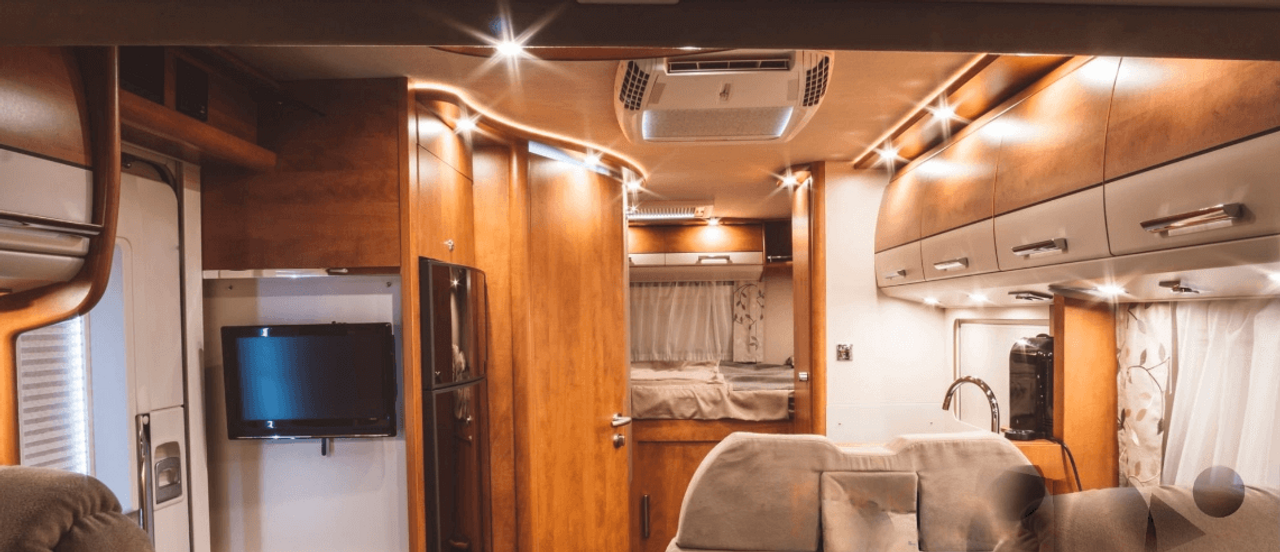How to Run RV Air Conditioning Off Solar
RV air conditioners are crucial for staying cool on the road, but they can significantly drain your power supply. Integrating solar panels into your RV setup offers an efficient and eco-friendly solution. solar panels harness sunlight to generate electricity, reducing dependence on traditional power sources and cutting down on energy costs. Using solar panels to run your RV air conditioner ensures a sustainable power source, especially during sunny days when cooling is most needed. This article explains how RV solar panels work and whether you can use them to run an RV air conditioner. Furthermore, we’ll also explore whether it’s worth using solar for your RV and how to effectively combine RV air conditioners with solar panels, ensuring you stay comfortable while traveling sustainably and cost-effectively.
Can a Solar Generator Power an RV Air Conditioning
Yes, a solar generator can power an RV air conditioner, providing a sustainable and cost-effective solution. Solar panels harness sunlight to generate electricity, reducing your reliance on traditional power sources and lowering energy costs. By using solar power, you can enjoy a cooler RV environment without worrying about draining your batteries or running a noisy generator. This eco-friendly approach also minimizes your environmental footprint, making your travels more sustainable.
When planning to use solar energy to run your RV air conditioner, several considerations are crucial. First, ensure your solar system is sufficiently large to meet the energy demands of your air conditioner. The size of your RV air conditioner and the amount of sunlight available each day play significant roles in determining the system's effectiveness. High-efficiency solar panels are essential for maximizing energy capture.
Backup batteries are also essential to ensure your air conditioner runs smoothly without interruption. Proper planning and installation of these components will ensure that your RV stays cool and comfortable while reducing reliance on traditional power sources. By considering these factors, you can effectively use solar energy to power your RV air conditioner, enjoying the benefits of a sustainable and reliable power solution on the road.
How Does a Solar Generator Power an RV Air Conditioner

Solar generators can power RV air conditioners by harnessing solar energy and converting it into usable electricity. The system starts with solar panels that capture sunlight and transform it into direct current (DC) electricity. This power is then regulated by a charge controller and stored in deep-cycle batteries. When the air conditioner needs to run, an inverter converts the stored DC power into alternating current (AC), which most RV air conditioners require.
The challenge lies in meeting the high power demands of RV air conditioners, which typically need 1,500-3,500 watts to start and 500-1,500 watts to run. A robust solar setup with adequate panel capacity, battery storage, and a powerful inverter is crucial. For reliable performance, consider Renogy solar kits, which offer comprehensive solutions for RV solar power needs. Energy-efficient air conditioning units and conservation practices can help optimize performance. While initially costly, this system offers off-grid freedom, reduced campground dependency, and eco-friendly cooling for RV enthusiasts.
Components Needed to Run an RV Air Conditioner with Solar
To set up this system, you'll need several key components working together. Each element plays a crucial role in capturing, storing, and delivering solar power to your RV's air conditioner. Here's what you'll need:
1. Solar Panels
High-efficiency solar panels are the heart of your system. They capture sunlight and convert it into usable electricity. Installing solar panels on the RV roof or having a movable solar panel suitcase can effectively solve the problem of energy supply. With a right angle and aundant direct sunlight, the solar panels are able to generate electricity. For running an RV air conditioner, you'll typically need:
- Multiple panels totaling 1000-2000 watts, depending on your AC unit's power requirements
- Monocrystalline panels for best efficiency in limited roof space
2. Deep Cycle Batteries
Batteries store the energy collected by your solar panels for use when the sun isn't shining. The more solar panels you have, the more power they can replenish in your batteries. However, this power is wasted if your batteries can't hold all the energy the panels produce. This is why it's important to make sure you have a large enough battery bank to meet the energy needs of an AC unit. For an RV AC system, consider:
- Lithium-ion batteries for their high efficiency and long lifespan
- At least 200-400 Ah (Amp-hours) of battery capacity
3. Inverter
It's crucial that your inverter is large enough to handle both the starting power and running power of your AC appliances. Inverters turn DC power produced from your solar panels and stored in your battery into AC power. For an RV air conditioner, the starting wattage is typically around 3,000 watts. However, you’ll want to purchase an inverter between 3,500 and 4,000 watts so you don’t max out your inverter.
It also may be a good idea to buy a soft starter. A soft starter reduces the level of that initial power surge, often by more than 50%. This will allow you to have a smaller inverter to supply power to your air conditioner. Another option to consider is to run your AC on generator power for the first few minutes and then switch it off and rely on solar power. In this example, the generator is covering that initial energy spike.
An inverter converts the DC power from your batteries into AC power that your air conditioner can use. Look for:
- A pure sine wave inverter for clean, stable power
- An inverter rated at least 3000 watts to handle the AC's high startup power draw
4. Charge Controller
This device regulates the power flowing from your solar panels to your batteries, preventing overcharging. You'll need:
- An MPPT (Maximum Power Point Tracking) charge controller for optimal efficiency
- A controller rated to handle your total solar panel wattage
5. Circuit Breakers and Fuses
For safety and system protection, include:
- Appropriately rated circuit breakers between major components
- Fuses for smaller circuits and devices
What Size Solar Generator Do You Need to Run an Air Conditioner
Choosing the right size solar generator for your air conditioner depends on your AC's power requirements and usage patterns. Consider both running watts (power for continuous operation) and starting watts (power for initial startup, typically 2-3 times higher). To calculate the minimum solar generator capacity needed, use this formula:
Minimum Capacity (Wh) = (AC Running Watts × Daily Use Hours) × 1.2
The 1.2 multiplier accounts for system inefficiencies and starting watts.
For example, a 500W AC used 8 hours daily needs at least a 4,800Wh generator: (500W × 8h) × 1.2 = 4,800Wh. A 1,500W AC used 6 hours daily requires at least 10,800Wh: (1,500W × 6h) × 1.2 = 10,800Wh. Always choose a slightly larger capacity to handle cloudy days and additional power needs. Ensure the inverter can manage your AC's starting watts for reliable performance.
How Long Can a Solar Generator Run an AC
A solar generator's ability to run an AC varies based on the generator's capacity and the AC's power needs. Typically, a mid-sized solar generator can power a small, efficient AC for 2-4 hours. A high-capacity solar generator with a 5000 Wh battery, 90% inverter efficiency, and 1000 watts of solar panels can run a 1000-watt air conditioner for approximately 10.5 hours per day, considering optimal solar conditions.This duration can be extended if the solar panels are actively recharging the generator during use, especially on sunny days.
Several practices can extend an AC's operating time on a solar generator:
- Use energy-efficient AC models to reduce power consumption.
- Ensure good insulation in the cooled space to maintain temperature longer.
- Supplement with fans to improve air circulation and cooling efficiency.
- Maximize solar panel exposure during daytime for continuous recharging.
- Consider expandable battery capacity options for longer cooling periods.
- Adjust AC settings to run at lower power when possible.
Is It Worth Using Solar for Your RV Air Conditioner
As more RV enthusiasts hit the road seeking sustainable and eco-friendly travel solutions, solar power has become a popular option for powering various appliances, including air conditioners. But is it really worth using solar for your RV air conditioner? Let's dive into the key benefits and considerations to help you decide.
Benefits of Using Solar Power for Your RV Air Conditioner
- Energy Independence: Generate your own electricity, reducing reliance on campgrounds and generators, and allowing more off-grid exploration.
- Cost Savings: Despite a high initial investment, long-term savings on fuel and electricity can be significant.
- Eco-Friendly: Solar power reduces your carbon footprint and contributes to a greener planet.
- Quiet Operation: Solar panels operate silently, unlike noisy generators, enhancing your camping experience.
Considerations Before Going Solar
- Initial Costs: The upfront cost of solar panels, batteries, and installation can be high, requiring careful budget evaluation.
- Power Requirements: Ensure your solar setup can meet the high power demands of air conditioners, especially in hot weather.
- Space for Panels: Check if your RV has enough roof space to accommodate the necessary number of solar panels.
- Sunlight Availability: Solar power depends on sunlight, so frequent travel to areas with limited sun exposure can affect efficiency.
Traveling In Comfort: Renogy RV Power Kits
Embark on a journey to sustainable energy independence with Renogy RV Power Kits, designed to equip your recreational vehicle (RV) with efficient solar solutions. Featuring the innovative Renogy 200 Watt 12 Volt Flexible Monocrystalline Solar Panel, these kits offer two compelling options: The PilotCar Kit and The Navigator Kit.

The PilotCar Kit: Ideal for adventurers seeking compact power solutions, the PilotCar Kit boasts a 2.56kWh storage capacity, capable of handling up to 520W of solar input power and delivering a maximum solar output of 2kWh. This kit ensures reliable energy supply for essential RV functions, allowing flexibility and efficiency on the road.
The Navigator Kit: For those requiring extended power autonomy, the Navigator Kit presents a robust choice with a 5.12kWh storage capacity. It supports up to 800W of solar input power and provides a maximum solar output of 3kWh, catering to larger RVs or prolonged off-grid stays. With enhanced capacity, this kit empowers users to enjoy extended comfort and convenience while minimizing reliance on traditional fuel sources.
Experience the freedom of sustainable energy with Renogy's comprehensive RV Power Kits, designed to elevate your travel experience while reducing your environmental footprint. Whether you're a weekend explorer or a full-time nomad, these kits offer reliable, efficient, and environmentally friendly energy solutions for your mobile lifestyle.
Conclusion
Learn how to use the sun to run your RV air conditioning, giving you an eco-friendly cooling solution wherever your adventure takes you. By harnessing the power of the sun, you can ensure comfort without relying on traditional power sources, reducing costs and environmental impact. Using efficient solar panels and a compatible inverter optimizes energy conversion, allowing continuous use of air conditioning even in remote areas. Enjoy the freedom of off-grid living while enjoying the comforts of home with a sustainable RV air conditioning powered by the sun.
Frequently Asked Questions
1. Will a 2000 watt solar generator run a refrigerator?
A 2000 watt solar generator can power a small refrigerator efficiently. Larger or less energy-efficient models may exceed its capacity. Checking the refrigerator's wattage and the generator's output ensures compatibility. Choosing energy-efficient appliances and monitoring usage maximizes effectiveness when running a refrigerator off-grid with a 2000 watt solar generator.
2. How many solar panels to run air conditioners?
The average RV air conditioner requires around 1,800 watts of electricity to start and 650 watts per hour to cool down your RV. If you’re in a school bus or an RV with ample roof space, you could consider a set of 16 x 100 watt solar panels to meet those energy needs. If you are more limited on space, you may want to consider looking into larger, high efficiency solar panels that are often found on residential homes. Renogy has high-efficiency solar panels for ac units.
3. How many 12 Volt batteries to run an air conditioner?
In order to get 8 hours of running an air conditioner on battery power, you will need a lot of batteries. You may need about 16 to 20 flooded, deep-cycle batteries, at 100 AH each, to run two air conditioning units for 8 hours. By comparison, you will need about 8 lithium batteries at 100 AH each.
4. How many watts does an RV AC use?
As we've mentioned before, RV air conditioner usually eats up 1,800 watts of electricity on average to start and runs on 650 watts per hour. However, the wattage of each RV air conditioner can be different. You can check it out on the specification tag or inquire your RV conditioner supplier for a specific answer.











